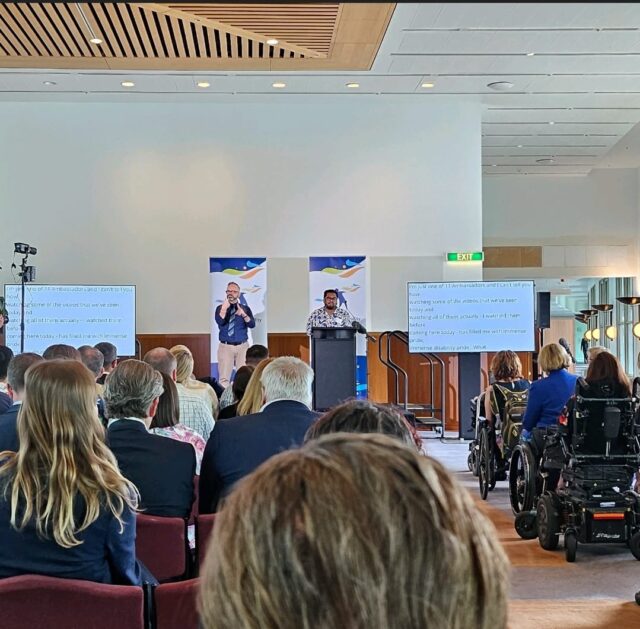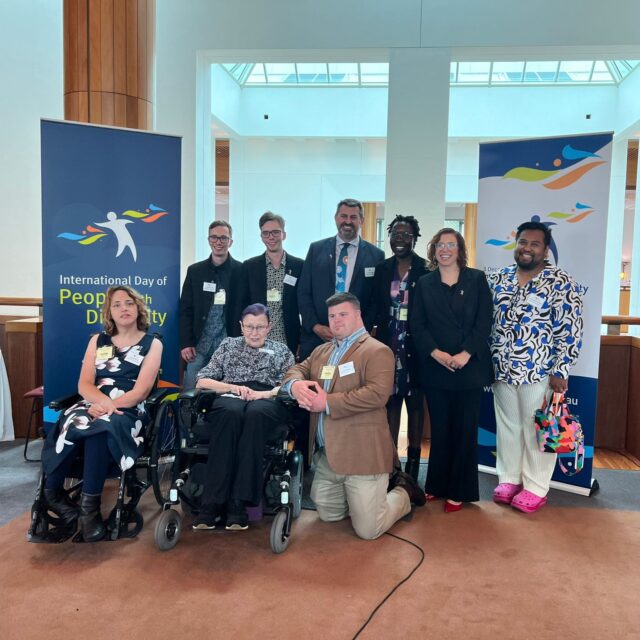International Day of People with Disability
Morning tea address, 30 November
Mural Hall, Australian Parliament House
Giancarlo de Vera, Senior Manager Policy at PWDA and 2023 International Day of People with Disability (IDPwD) Ambassador, gave an address at Australian Parliament House, Canberra on Thursday 30 November.
“The power of ableism is the pressure to conform. But the antidote to ableism is the pride to simply be: as imperfect, yet full and complete human beings,” Giancarlo said.
In their address, Giancarlo calls for everyone to accept that disability is part of the human condition, that there is no normal way to be human.
Giancarlo’s full address is below.

I too, would also like to acknowledge the Ngunnawal people, and pay my respects to Elders past and present and emerging.
I am also proudly from the Waray tribe in the Philippines, and so I would also like to extend that culture to this place.
To share quickly a bit about myself, part of my psychosocial disability is my Dissociative Identity Disorder, and so under immense pressure I can dissociate.
I’m proverbially — I won’t finish that sentence. But seeing so many friends in this room today warms my heart and calms me down.
So I want to take this opportunity to celebrate — each and everyone — of my fellow Ambassadors.
Especially those who couldn’t be here, like Anja who I spoke to last night.
So can I please ask you all to join me in applause, to celebrate our Ambassadors!
This year I am just 1 of 11 Ambassadors, and I can’t tell you how watching everyone’s videos filled me with immense pride. Immense disability pride!
What struck me was the sheer diversity of our experiences, our passions, and our stories.
It reminded me of a simple truth that I hold dear — and in a lot if ways — what drives me as an advocate: Disability is part of the human condition.
Disabled people have a right to be full and complete humans, but for too long — and even now — we’re still being stifled in imagining what that means for us.
As citizens and rights-holders.
As a community.
And most importantly, as individuals.
Many disabled people — and I would hazard probably all disabled people — have a story to tell about being made to feel less than.
For not having a “normal” body.
For not having a “normal” mind, like me.
Or for not acting “normal”.
But if we accept that disability is part of the human condition, then we also have to accept that there is no normal way to be human.
The power of ableism is the pressure to conform.
But the antidote to ableism is the pride to simply be: as imperfect, yet full and complete human beings.
And in my case, a ball of contradictions.
I grew up deeply religious, but I’m proudly queer and non-binary.
I can stand here before you looking like I’m present, but I’m nearly dissociating to appear that way.

I really suck at singing, but will not hesitate subjecting you all to my terrible singing.
Just not today! You’re lucky.
So being proud to simply be, no matter how much it deviates from the norm, is leadership in action.
As disabled people who naturally shirk and shruf at norms — that seek to define us as human beings.
We are trailblazers.
We are challenging non-disabled people to reimagine what it means to be disabled.
My existence — and my visibility– as a queer, disabled, non-binary person of colour, who can’t sing, shines a light on a future where someone like me can be proud to simply be.
Instead of the shame I had to endure.
I’m role modelling.
All disabled people are role modelling.
And through role modelling, we give others — non-disabled people — permission to imagine a future where we can be so much more. Where disabled people can be so much more.
A future where we can sing — and metaphorically for my non-verbal friend — at the top of our lungs, that:
We are here
We are proud; and
We are included.
